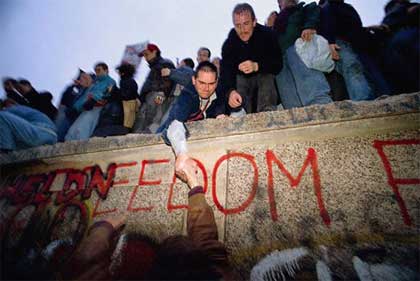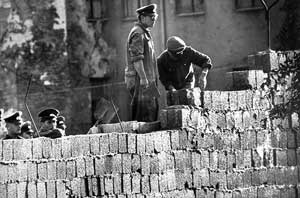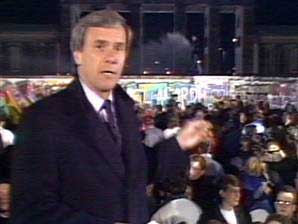[Bianculli here: PBS presents a new documentary on the Berlin Wall tonight, and contributing writer Tom Brinkmoeller gives us an advance look at the literally two-sided political story...]
PBS Special Expertly Rebuilds History of Berlin Wall
 When the Berlin Wall went up, almost overnight, in 1961, I was in high school, and more tuned in to trying to pass the next chemistry exam than to world events. I could be excused for not paying the closest attention.
When the Berlin Wall went up, almost overnight, in 1961, I was in high school, and more tuned in to trying to pass the next chemistry exam than to world events. I could be excused for not paying the closest attention.
But when it started to fall, in November 1989, I was an adult, something of a news junkie and one who enthusiastically hoped detente might finally be making the world a peaceful place. I thought I knew a lot about that stage of history. I might even have been a little smug in my knowledge about what was happening in Germany, the country from which my grandparents emigrated.
 That "I know it all" attitude stayed intact and inactive until I watched The Wall -- A World Divided, a PBS special premiering tonight (Monday at 10 ET; check local listings). Like a 50-year flashback to the day of my chemistry test, I quickly realized how little I really knew.
That "I know it all" attitude stayed intact and inactive until I watched The Wall -- A World Divided, a PBS special premiering tonight (Monday at 10 ET; check local listings). Like a 50-year flashback to the day of my chemistry test, I quickly realized how little I really knew.
This hour-long documentary is the best history of that 28-year span of Soviet-Western high-stakes poker I've ever seen. History wonks may disagree, but I've never been one who finds joy in digging through mountains of minutiae to find a gem of a fact. Nicely, producer-director-writer Eric Stange has done that for us.
His hard work and excellent reporting shows throughout. Inside an hour, he effectively and thoroughly sets the stage for the crisis, walks viewers through an interesting and fact-filled chronicle of the wall's 28-year existence, and covers the events that led to its dismantling.

But even more interesting than the facts is that Stange includes recent interviews with many of the people who were pushing the power buttons at the time: Mikhail Gorbachev, under whose leadership of the Soviet bloc the dismantling took place; former President George H.W. Bush, vice president to President Ronald Reagan when Reagan made his memorable "Mr. Gorbachev, tear down this wall!" speech (and President when the "tearing down" finally happened); Bush Secretary of State James A. Baker and National Security Advisor Brent Scowcroft; Helmut Kohl, chancellor or West Germany at the time the wall fell; and others who lived as ordinary lives as possible in that divided country.
Their comments on the history that was happening around them give more insight than I have seen before. Gorbachev, for example, says he "was not at all impressed" with Reagan's taunt, noting that Reagan had been an actor long before he was a statesman. Bush, who was the first American leader to meet Gorbachev (at the funeral of Gorbachev predecessor Konstantin Chernenko) told Reagan the new General Secretary was "very different."
Bush also tells why there was a restrained, almost silent, response from his administration as the long division between the two Germanys was ending -- a diplomatic balancing act that confused some observers at the time but which Bush (and his then Soviet Affairs Advisor, Condoleezza Rice) convincingly explain more than 20 years later.
And this is the first time I learned that Tom Brokaw unwittingly sped up history. At a Nov. 9, 1989, press conference, an East German official read a prepared statement detailing the easing of travel restrictions between the two German states. A reporter asked when the changes would take effect, and the unprepared official mistakenly answered, "Immediately."

Within hours, thousands of people were making preparations to move from the east to West Berlin and Brokaw was on the air, showing the crowds that had shown up at a crossing point. It became a world event, and the East German guards, being watched by millions on television and having no instructions on what to do, let them pass. The memorable images of Germans from both sides gathering all along the wall and celebrating the end soon followed.
Stange also includes footage of an October 1989 protest by more than 70,000 people in Leipzig, East Germany -- surreptitiously taken from a church steeple, because the East German secret police had banned any video coverage. With the Chinese crush of the protests in Tiananmen Square only months old, troops could have intervened and the events could have been just as bloody. The footage shows armed troops nearby, but they weren't mobilized and the anti-government movement picked up more momentum.
I doubt I'll be the only one who watches this program who doesn't say, at least once, "I didn't know that."
The Wall -- A World Divided isn't term-paper tedious or talking-head boring. It's an excellent hour that engagingly explains one of the seminal events in modern world history. A bit of diplomatic advice: Give the commercial networks' all-the-same programming the night off and treat yourself to some one-of-a-kind programming.
Consider it, if you like, your own little protest.